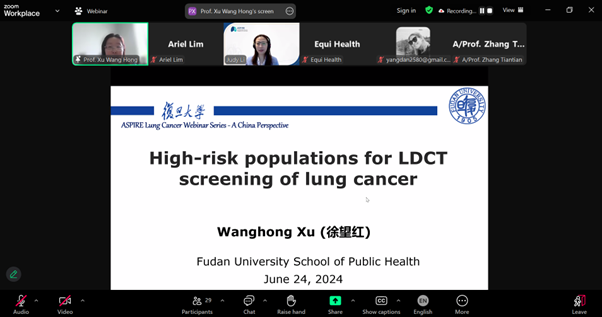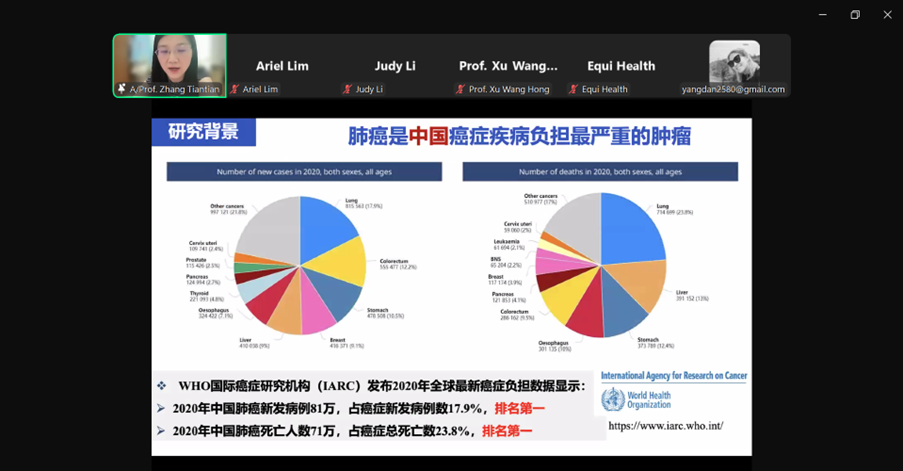We have successfully conducted our ASPIRE Webinar series – A China Perspective, held on Monday, June 24, 2024. It was an enlightening session that deepened our understanding of the unique dynamics of lung cancer in Mainland China and shed light on the intricacies involved in establishing a nationwide screening program.
The webinar was hosted and moderated by Judy Li, ASPIRE Manager, who first provided a brief introduction to ASPIRE, formally marking its presence in Mainland China. We had the honor of hosting two distinguished keynote speakers who shared insights on the following topics.

Prof. Xu Wang Hong from Fudan University delivered a compelling presentation on the criteria for high-risk populations in low-dose computed tomography (LDCT) lung cancer screening in China. She highlighted the importance of understanding risk factors at both the population and individual levels to accurately define high-risk groups. A key takeaway was that China has distinct risk factors compared to more studied global populations, necessitating unique criteria for high-risk groups that extend beyond conventional factors like smoking status and age. For instance, non-smoking females face an increased risk due to passive smoke exposure and indoor air pollution. The development of country-specific screening strategies that account for unique local risk factors is important to address these nuances and enhance screening effectiveness.
A/Prof. Zhang Tian Tian from Jinan University provided an in-depth health economics assessment of lung cancer screening program implementation. While false positives raise concerns about overdiagnosis and overtreatment, the benefits generally outweigh the risks, especially considering that lung cancer is often diagnosed at a later stage in non-smokers. Studies have shown that early detection through screening can reduce lung cancer mortality by up to 30% in the Chinese population, highlighting the crucial role of screening programs in improving outcomes. Effective management of pulmonary nodules is crucial for enhancing early detection and optimizing treatment by accurately identifying high-risk nodules, thereby improving cost-effectiveness and minimizing unnecessary interventions. Using risk prediction models to stratify patients and determine screening cut-off points can optimize outcomes and predict positive rates. Policymakers can leverage these insights to develop evidence-based screening guidelines and allocate resources efficiently, advancing public health strategies and patient outcomes.

These insights demonstrate that advancing lung cancer screening in Mainland China hinges on integrating local risk factors and utilizing advanced risk prediction models. Screening strategies should evolve along with research findings to ensure they remain relevant and effective for specific risk profiles. This involves prioritizing evidence-based policies, such as implementing low-dose CT screening for high-risk populations, tailored to local needs. By aligning global best practices with local nuances, we can ensure more effective early detection and treatment outcomes. Collaborative efforts among multiple stakeholders such as policymakers, researchers and healthcare providers will be essential in implementing effective, nationwide strategies to enhance lung cancer care in China.
In the coming months, look forward to a White Paper assessing the current status of lung cancer policies and gaps in 11 select APAC health systems, including China. This pioneering White Paper will utilize a comprehensive indicator framework to identify specific policy gaps and propose actionable recommendations — a critical step in advancing collaborative efforts for progress, fulfilling our mission at ASPIRE, and prioritizing critical areas for change.
At ASPIRE, we are committed to fostering a collaborative, multilateral approach to drive change across the patient care continuum, with a focus on improving patient access to care and outcomes. Stay informed by following us on LinkedIn.
If you are interested in learning more or joining our initiatives, please reach out.
Together, let’s lead the way in reducing the lung cancer burden and improving patient outcomes in the Asia Pacific region, including China.